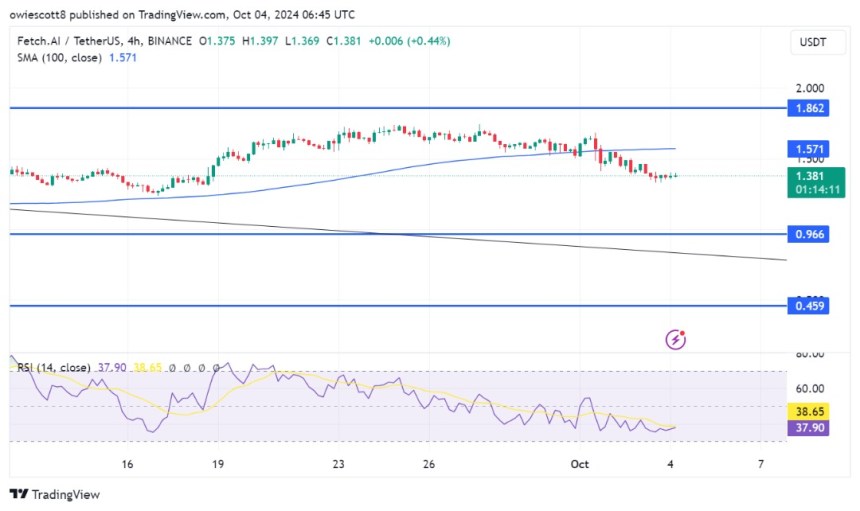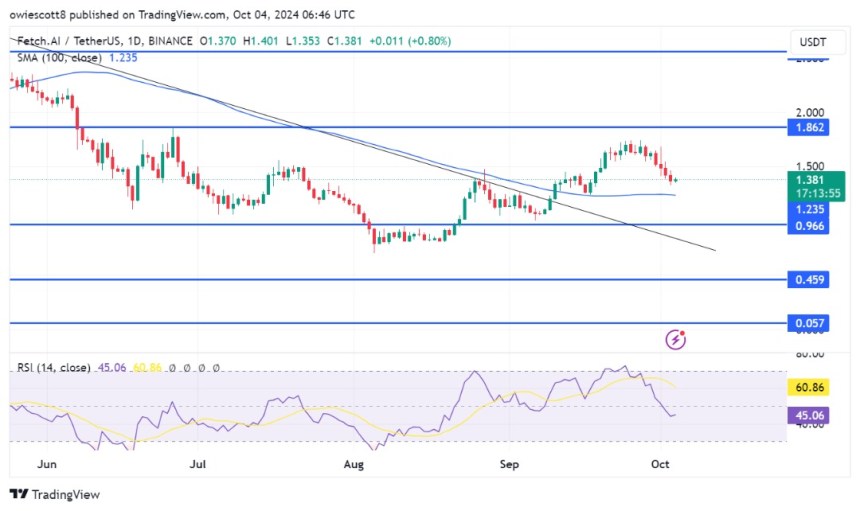Recent price action is painting a bearish picture for FET, with the Relative Strength Index (RSI) signaling the potential for further declines. As the RSI hovers in bearish territory, the momentum seems to be favoring sellers, raising concerns of a deeper downturn.
In the midst of the intensifying downside pressure, attention is shifting to the critical $0.9 support level. Holding this level is crucial for avoiding additional losses, as a breakdown could lead to more significant declines.
With current market sentiment suggesting more losses may be in store, this article aims to analyze the ongoing bearish extension in FET, focusing on how the RSI signals increased bearish pressure. By examining key technical indicators and market trends, this piece will explore whether FET is likely to experience more declines or if any potential support levels could trigger a rebound.
RSI Signals Growing Downside Momentum For FET
FET has recently shifted into bearish territory on the 4-hour chart, slipping below the 100-day Simple Moving Average (SMA) and heading toward the critical $0.9 support level. This decline below the 100-day SMA signals weakening momentum, with sellers gaining control over the market.

An analysis of the 4-hour Relative Strength Index reveals that the signal line has decreased below 50%, and it is currently at 37%, reflecting increased selling pressure and diminishing buying interest. With the RSI in this territory, this points to the possibility of further downside movement for FET, highlighting a lack of bullish conviction in the market.
Furthermore, FET on the daily chart is displaying negative momentum after struggling to surpass the $1.8 resistance level. This struggle is highlighted by the formation of multiple bearish candlesticks, signaling persistent selling pressure in the market. Although the price remains above the 100-day SMA, which typically indicates a bullish trend, the inability to break through the $1.8 resistance suggests that upbeat strength is weakening, and FET could be poised for extended losses.

A closer examination of the RSI formation on the 1-day chart indicates that the RSI signal line has dropped to 44%, recently falling below the important 50% threshold. Typically, an RSI reading below 50 suggests a bearish sentiment, indicating that the asset is losing steam. Such a decline could signal potential deeper corrections for FET unless a reversal is observed.
Key Support Levels To Watch Amid Bearish Sentiment
With bearish sentiment prevailing in the market, the $0.9 support level has become particularly crucial for FET. A breach below this level could ignite heightened selling pressure, possibly driving the price down toward the $0.4 support mark and beyond.
If FET can maintain its strength and stay above the $0.9 support level, it may pave the way for a rebound, allowing the price to drift back toward the $1.8 resistance zone. A successful breakout above this key resistance level could spark a surge in buying activity, resulting in further gains as bullish momentum builds. Observing how FET reacts to these levels will be crucial, as they will indicate whether a recovery is on the horizon or if bearish pressure will reassert itself.
#FetchAIFET, #BearishCandlesticks, #Fet, #Fetusd, #Fetusdt, #RelativeStrengthIndex, #RSI, #SimpleMovingAverage, #SMA